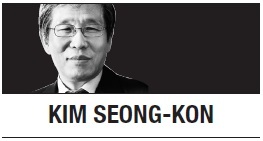 In his short story “Entropy” and his celebrated novel “The Crying of Lot 49,” Thomas Pynchon warns us of the possible annihilation of human civilization, using the second law of thermodynamics, also known as the entropy theory. According to Pynchon and the entropy theory, if everything becomes the same without diversity in an isolated system, its molecules will stop moving and the system will be in a steady state of equilibrium. Then the system will be pronounced dead, as the increase of entropy reaches the maximum level.
In his short story “Entropy” and his celebrated novel “The Crying of Lot 49,” Thomas Pynchon warns us of the possible annihilation of human civilization, using the second law of thermodynamics, also known as the entropy theory. According to Pynchon and the entropy theory, if everything becomes the same without diversity in an isolated system, its molecules will stop moving and the system will be in a steady state of equilibrium. Then the system will be pronounced dead, as the increase of entropy reaches the maximum level. Pynchon published the two works in 1960 and 1966 respectively, superbly delineating the landscape of American society in the 1950s and 1960s respectively. Those were the times when Americans were trapped in the either/or mentality between communism and McCarthyism, between liberalism and conservatism, and between the freaks and the squares. In his stories, Pynchon lamented the predicament of the American people who were caught in the crossfire between the Left and the Right, between hipsters and gray flannel suits, and between the street and the hothouse. He deplored the situation of America at that time that was sharply divided by the bipolarity of two antagonizing ideologies and sought a third possibility, avoiding the two extremes. He also admonished the danger of living in an insulated society where everybody and everything is identical, without any diversity or difference.
Perhaps, the same thing goes for Korean society today. According to the second law of thermodynamics, entropy will exponentially increase until our annihilation, unless we embrace diversity in thought and culture and stop pursuing uniformity, equilibrium and equalization. That is why Pynchon warns about the danger of a monochromatic society and celebrates the colorful rainbow coalition instead. Yet our society does not seem to tolerate differences and diversity. We tend to exhibit hostility toward anyone who is different from us, in culture, ideology or opinion. We also discriminate based on one’s school, hometown and religion. These days, we even hate the opposite sex, a phenomenon known as “yeohyeom” and “namhyeom,” which means “women hating syndrome” and “men hating syndrome.” In addition, we also witness antagonism between the young and the old in our society.
Pynchon warns us that bipolarity will inevitably increase entropy in our society and as a result, annihilate it in the end. Interestingly, Pynchon perceived the uniformity and the sameness as total chaos and disorder. The problem is that, once started, the entropic process is irreversible. We can only slow down the process by welcoming differences and diversity. Otherwise, we are doomed.
How then can we delay the inevitable and imminent annihilation? A Scottish physicist James Clerk Maxwell came up with an idea. He did a thought experiment by which he suggested that the entropy theory might be violated somehow. In his thought experiment, when entropy reaches the limit in a closed system, an intelligent demon appears and begins to sort out the stagnant molecules by controlling a door connecting two chambers through which it makes the molecules move around and pass into the other chamber. Then the moribund system can revive, significantly decreasing entropy and thus postponing the annihilation. To Maxwell, a demon meant “a guardian spirit,” as the term “demon” referred to one’s guardian spirit in ancient times. In physics, the guardian spirit imagined by Maxwell is called Maxwell’s Demon.
We, too, urgently need a Maxwell’s demon in our society, that can sort out identical, thus stalemated molecules to create diversity. Instead of making our society a place of monochromatic uniformity, our Maxwell’s demon will procreate colorful variety. And instead of instigating personal vendetta and antagonism toward his political foes, he will bring reconciliation by holding even his critics and dissidents in his arms. A Maxwell’s demon will cross the boundary between two opposing ideologies, and transcend the gravity of conventional thought. Political leaders, opinion leaders or intellectuals should be our Maxwell’s demon. So are heads of government institutions and organizations.
Unfortunately, however, it is hard to find a Maxwell’s demon in our society these days. Political leaders are almost always narrow-minded, opinion leaders are often misleading, and intellectuals are frequently opinionated. In other countries, there has always been a Maxwell’s demon in times of crisis. In Korea, however, we have always had incompetent leaders in every critical moment. Our two kings during the Yi Dynasty, Seonjo and Injo, are a good example. Seonjo was not aware of the impending Japanese invasion in 1592 and thus was completely unprepared, and Injo was ignorant of the international situation and as a result, invited the Chinese invasion in 1936. The outcome of their incompetence and ignorance was catastrophic to their nation.
In the 21st century, we should be different. It is high time we had a Maxwell’s demon that can revive out society and steer us in the right direction by embracing diversity, bringing reconciliation, and skillfully navigating through the perilous seas of international politics. We desperately need a Maxwell’s demon in our society now.
By Kim Seong-kon
Kim Seong-kon is a professor emeritus of English at Seoul National University and president of the Literature Translation Institute of Korea. He can be reached at sukim@snu.ac.kr. -- Ed.


















![[Today’s K-pop] Treasure to publish magazine for debut anniversary](http://res.heraldm.com/phpwas/restmb_idxmake.php?idx=642&simg=/content/image/2024/07/26/20240726050551_0.jpg&u=)